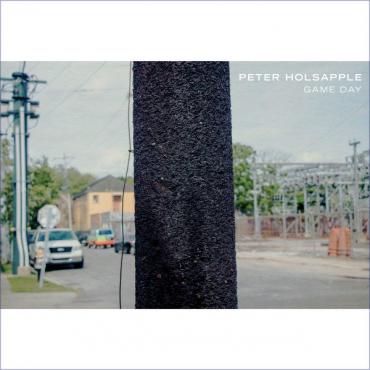
Peter Holsapple, co-founder of the dBs, certainly hasn’t been away; he’s been playing over the years with R.E.M., John Hiatt, the Indigo Girls, Continental Drifters, and the Troggs, to name only a few, but he’s now delivered to our doorsteps his first solo album in 21 years, and it’s a real gift. When we open it, we discover he’s given us canny, brilliant lyrics that capture the muddled and maudlin, the hesitant and hopeful, the exhilarating and the exasperating character of the human condition. He ingeniously wraps these lyrics in powerful chords and singeing lead riffs that mirror the burning messages of the words. As he writes in the title track, he wasn’t sure he was ready to get back in the game, but he’ll be damned if he’s going to fade away. In his liner notes, Holsapple shares a little of his attitude toward the album and extends an invitation to us: “Today, with all the hard competition in the music business, it’s almost impossible to come up with anything totally original. So I haven’t. But I had a lot of fun making Game Day, and I hope it comes through when you hear it. So sit back and listen and try and decide if you can find a small place in your heads for it.”
The wistful melancholy of sparse harmonica runs and guitar chords open a false door for the raucous title track, which kicks off the album. Rocking along on twisting, sometimes accusatory riffs — sonically reminiscent of a range of sounds from Spirit to Edgar Winter to John Lennon — Holsapple takes up the challenge to play the rock and roll game, even while acknowledging the often impersonal and hollow character of the industry (“And everything will have changed/But it’s all the same, you’re/Just a staple on a telephone pole”). Asking himself if he still has what it takes, he defiantly screams: “If you put me in the game, I’ll play/if I don’t, I won’t just fade away/If you put me in the game, I’ll play today.” The hollow shuffle of “Inventory,” shambling along as it does, reflects the halting hesitancy, as well as the reluctant embrace of the loneliness that comes with cleaning out the accumulated detritus of the house where you grew up. As if to reflect the ways that physical objects can create feelings of security and permanence, the singer catalogs thing after thing — “Box of Geographics, empty bottles of wine/And stamps and pens and old golf balls/Bookshelves full of paperbacks from wall to wall” — that fill his parents’ house. As he packs all this stuff up, though, he screams “everything is gone,” illustrating the illusory character of the permanence created by objects, as well as the loss of certainty that anything at all lasts.
“Continental Drifters” slips back to an earlier time to celebrate life in another place, time, and band in a slow, almost folksy, ballad. The insistent, urgent, driving guitars that open and lie under “She Handed Him a Pencil” mirror the insistent tone of the woman who continually implores — even nags — the singer to grab onto something he can hold onto, like a pencil or a baby, or something he can believe in or something he can do, other than sit in silence. The circular whirl of the Leslie cabinet on the organ swirls around like the questions spinning around him and in his mind. Holsapple brilliantly captures the turgid lethargy inherent in the fiery ambivalence of a dead relationship in this song. Raw emotions fuel the even rawer Skynyrd-like riffs and primal vocals of “Don’t Mention the War.” The singer’s uncle, Lonnie, suffers PTSD, and the singer captures the sadness of his uncle’s condition in simple lyrics: “When uncle Lonnie stays at our house/We’re quiet as a mouse/We don’t want to wake him/We don’t want to shake him up/Let him sleep/So don’t mention the war/What’d’ya wanna go and do that for/He’ll tell you those stories that make your skin crawl/Like they’ve always done, so I’m begging y’all/Don’t mention the war.” Stinging leads riffs float drive home the crying choruses, creating the haunting moments that inhabit the emotional ambivalence of everyone in the room with Lonnie.
Everyone is going to find her or his personal favorite on Game Day, and that’s its beauty and its power. Holsapple sees so clearly into so many of our shared human dilemmas that his music mirrors our moods, and for a few moments we can identify the universal in the personal in his songs — and that’s the mark of a great songwriter.




